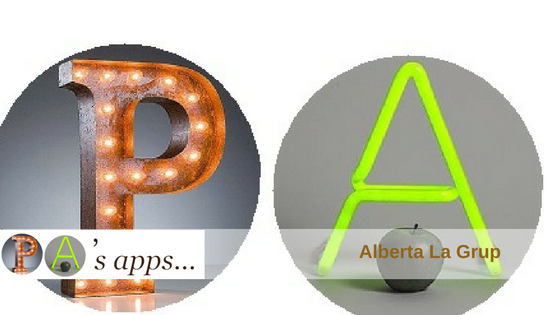
La Hora de los Assistants
(sigue en Español)
per Joana Bonet | 20.06.2015 – 01:58h | La Vanguardia
“Quan els professionals d’elit van començar a canviar les seves secretàries hipereducades per un assistant amb dos màsters, tres idiomes i un “sí” permanent en el somriure, el neologisme va portar dubtes i resistències, habituats com estàvem a l'”assistenta”, que a la vegada havia substituït la criada. Perquè el simple suport secretarial va ser usurpat per la tecnologia, i la creixent competitivitat requeria un altre tipus de col·laboració basada en tres eixos: preparació, criteri i …
Enlace al artículo en La Vanguardia, online
Enlace al artículo en La Vanguardia, online (español)
Enlace al artículo en el Blog de Joana Bonet
*****Traducción de Alberta La Grup a Español.
Cuando los profesionales de élite empezaron a cambiar a sus secretarias hipereducadas por un assistant con dos másters, tres idiomas y un “sí” permanente en su sonrisa, el neologismo trajo dudas y resistencias, habituados como estábamos a la asistenta, que a su vez había sustituido a la criada. Porque el mero apoyo secretarial fue usurpado por la tecnología, y la creciente competitividad requería otro tipo de colaboración basada en tres ejes: preparación, criterio y solvencia. El nuevo liderazgo, más horizontal y menos engolado, instauró otra idea acerca de las formas del poder que los gurús de Palo Alto se encargaron de exhibir con sus mesas redondas y sus videojuegos en la oficina. Así fue como muchas secretarias quedaron restringidas para los peces gordos, necesitados de sus primores, mientras que los assistants iban escalando posiciones al lado de profesionales de éxito como una especie de apuntadores o spin doctors júniors prestos a desarrollar estrategias además de reforzar anímicamente a sus jefes si se les fundía alguna bombilla.
Los primeros que se presentaban como asistentes de un diseñador, arquitecto o empresario tuvieron que barrer complejos demostrando que, si bien su puesto conllevaba alguna orden de tipo doméstico, la suya era una posición de confianza y privilegio. Casi tan ocupados como si fueran ellos las estrellas, con un alto nivel de presión y una diversificación de tareas que van desde ayudar a hacer los deberes de los hijos hasta la documentación de una ponencia, el assistant ha ido ganando poder de influencia y sacando la patita del pedigrí, hasta el extremo de ocupar el foco. Ahí está Hollywood, sin necesidad de guión, donde los assistants de Lady Gaga, Naomi Campbell, Lindsay Lohan o Claire Danes se encargan de airear trapos manchados: desde tener que dormir con ellas cogiéndoles la mano, hasta encender velas de azucena a su paso, o recibir un telefonazo en la cara.
Tanto es así que dos jóvenes mallorquines -Brais Vilasó y Xim Ramonell- decidieron explicar el fenómeno de la moda desde esa “segunda línea” y empezaron a editar una revista de moda llamada Assistant, en la que en lugar de ir a por los grandes se ocupan de buscar a sus manos derechas: jóvenes que saben mucho más de lo que cuentan y que aprenden de sus jefes cuán esquivo y peligroso es el éxito. “Ser asistente no es tanto ser el segundo como el siguiente. Ser una máquina de absorber, y en el momento justo dar el salto”, señala Vilasó. Primero hay que construir la confianza y, progresivamente, hacer valer las buenas ideas propias, hasta que un día, el jefe se da cuenta de que quien de verdad manda es su assistant, y tiene dos opciones: despedirlo o cederle el paso.
*****Translation into English, by Alberta La Grup.
When professionals of the elite began to change their educated secretaries for an assistant with two Masters, three languages and a “yes” permanent smile, the neologism brought doubts and resistance, accustomed as we were to the assistant, which in turn had replaced the maid. Because the sheer support from the assistant was usurped by technology, and the growing competitiveness required another type of partnership based on three pillars: preparation, discretion and reliability. The new leadership, more horizontal and less haughty, introduced another idea about the forms of power that Palo Alto’s gurus had ordered to display with round tables and video games in the office. That was how many secretaries were restricted to the fat cats in need of their workmanship, while the assistants were climbing positions alongside successful professionals as a kind of prompter, or junior spin doctors promptly developing strategies in addition to strengthening their bosses emotionally if they melted a bulb.
The first few served as assistants to a designer, architect or entrepreneur, had to sweep complexes showing that their job entailed some domestic type, and theirs was a position of trust and privilege. They were so busy you would think they were the stars, with a high level of pressure and diversification of tasks, ranging from helping with children’s homework to documents, the assistant had been gaining influence and pulling the leg of pedigree, to the point of taking the focus. That is Hollywood, without the need for script, where assistants of Lady Gaga, Naomi Campbell, Lindsay Lohan or Claire Danes are charged with airing stained clothes, from having to hold their hands while they sleep and lighting lily scented candles as they pass by (o recibir un telefonazo en la cara.)
So much so that two young Mallorcans – Brais Vilasó and Xim Ramonell- decided to explain the phenomenon of fashion since the “second line” and began to edit a fashion magazine called Assistant, on which instead of going for the big deals to seek their right hands: young people who know much more than we have and they have learnt from their bosses how elusive and dangerous success is. “To be an assistant is not so much be the second to the next. But to be a machine of absorbing and at the right time, to make the leap” says Vilasó. Firstly there is a need to construct the confidence and, progressively, enforce good ideas, until one day, the boss realises that who really commands is his assistant, and he has two options: dismiss him or give way.
Alberta La Grup editorial | Translation by Phoebe Bowell, Dec.’15





